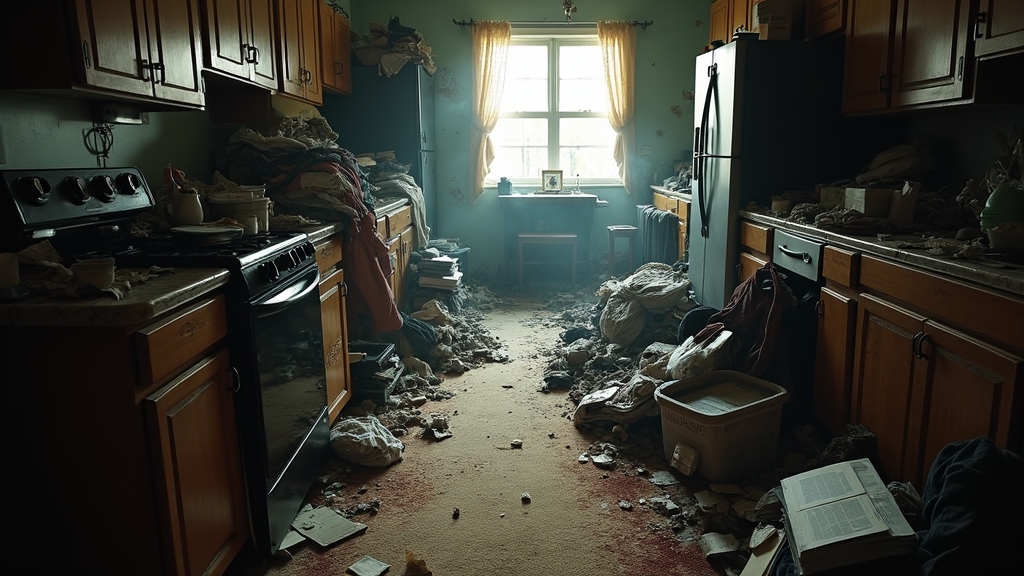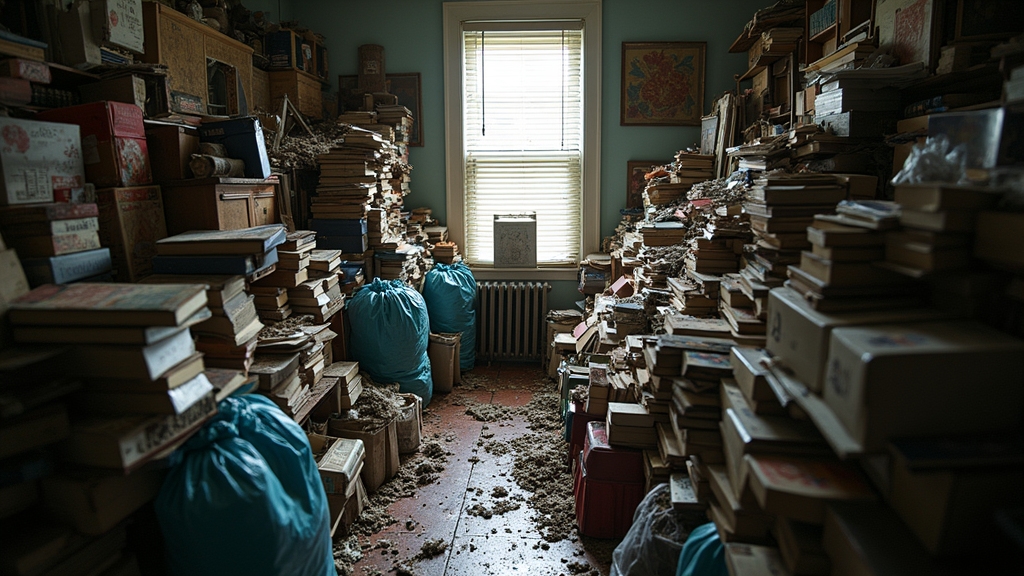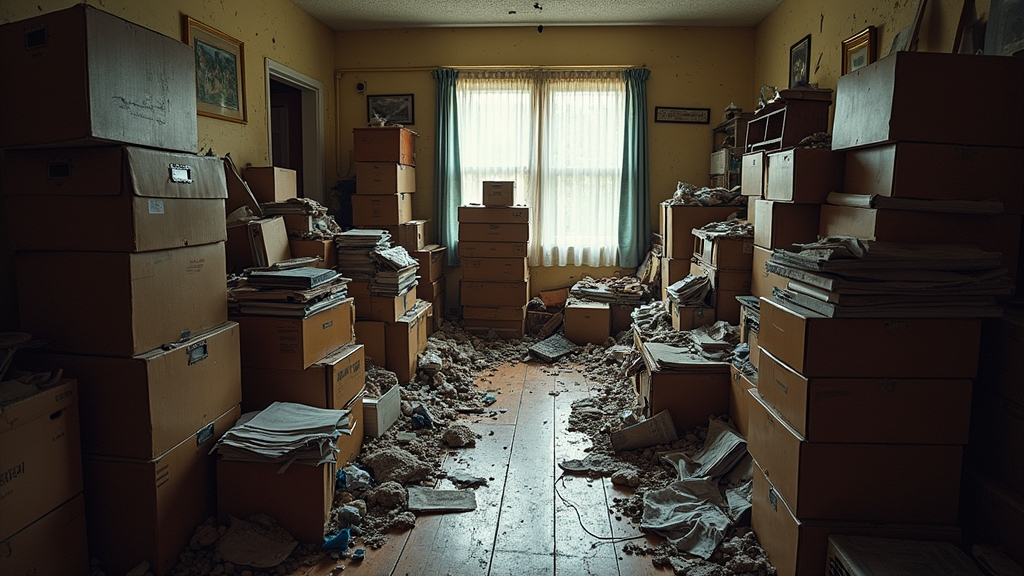Selling a hoarder home comes with unique legal risks. Owners must deal with disclosures, safety hazards, and potential code violations. These challenges can affect your sale price and timeline.
Ignoring or mishandling these legal issues can lead to lawsuits or expensive repairs. Buyers may back out if they spot hidden problems. Local authorities may also issue fines for non-compliance.
You can protect yourself and ensure a smooth sale by understanding and following legal requirements when selling a hoarder home.
This means learning what to disclose, handling hazards, and meeting local rules. This blog will guide you step-by-step so you can avoid costly legal mistakes when selling a hoarder home.
Key Takeaways
- Disclose all known material defects and hazards caused by hoarding to comply with legal requirements and avoid future lawsuits.
- Address and document the remediation of safety hazards such as mold, pests, and structural damage before listing the property.
- Ensure compliance with local codes and ordinances to prevent fines, legal penalties, or sale complications.
- Review tenant rights and provide proper notice before entering or showing the property if it is tenant-occupied.
- Engage professionals to handle legal paperwork, disclosures, and ensure all permits and estate issues are properly managed.
Understanding Hoarding and Its Legal Implications

Hoarding can lead to legal problems for homeowners and sellers. It is not just a private or personal issue. Excessive clutter may break local laws and safety rules. Legal and tax implications can arise if the hoarding creates hazardous conditions or violates property regulations. Hoarding can cause unsafe living spaces or damage to the property.
If fire exits are blocked or pests invade, you may face fines. Neighbors might sue if your hoarding affects them. Insurance companies might not cover damage linked to hoarding. Additionally, property regulations often specify standards for safe and clean properties, which hoarding can violate. If you plan to sell your home, you must address these risks. Seeking help early can prevent legal trouble.
Required Property Disclosures for Hoarder Homes
When selling a hoarder home, you must comply with material defects disclosure laws, especially regarding issues that could affect a buyer’s decision. You’ll need to address any health and safety concerns, such as mold, pests, or structural damage, and ensure your property meets local ordinance requirements.
Clear, accurate disclosures protect you from legal claims and help enable a smoother transaction. Utilizing cash buyers can facilitate a swift sale, reducing exposure to extended negotiations and potential legal complications. Conducting a title search beforehand can reveal pre-existing issues like liens or boundary disputes that may impact the sale process.
Material Defects Disclosure Laws
State laws require sellers to tell buyers about known problems with a home. These rules include any issues found in hoarder homes. If you hide or fail to mention problems, you could face legal trouble.
Material defects can lower a home’s value or make it unsafe. Problems caused by hoarding, like hidden damage, must be shared with buyers. If you do not disclose these, buyers can cancel the sale or sue you.
You should keep records of all known issues before selling. If you are unsure what to report, ask a lawyer for help. Following these steps helps you avoid breaking disclosure laws.
Health and Safety Concerns
Health and safety concerns are important legal issues in hoarder homes. Sellers must report any condition that could harm buyers. These include pests, mold, or biohazards found in cluttered homes.
Sellers should clean the home carefully before listing it. They must keep records of all cleaning and repairs done. This documentation helps show honest effort.
If needed, sellers should hire experts to check for hazards. Buyers may also want to know about the mental effects of hoarding on the property. Clear and honest disclosures reduce future arguments and build trust.
If sellers hide problems, they risk legal trouble later. Transparent communication and proper cleaning protect both the seller and the buyer.
Local Ordinance Compliance
Local ordinances set rules for what you must disclose when selling a hoarder home. You need to check these laws before listing your property. If you do not, you could face legal problems or lose the sale.
Most cities require you to report violations like clutter, pests, or fire hazards. Zoning rules may also limit how you use or store items on your property. A hoarder home often breaks these rules.
You should contact your local code enforcement office. They can tell you if your property is breaking any laws. If you fix violations and share honest information, you can avoid future disputes and make selling easier.
Navigating Local Health and Safety Codes
You’ll need to identify any local health and safety code violations before listing your hoarder home. Make sure you schedule required property inspections and keep records of all compliance documentation. Taking these steps helps you avoid legal setbacks and ensures a smoother sale.
Additionally, understanding local regulations related to property conditions can help you anticipate and address potential issues proactively. Being aware of the presence of structural damage or infestations can also influence your compliance requirements and disclosure obligations.
Understanding Code Violations
Code violations can greatly affect the sale of a hoarder home. Local health and safety rules may delay or stop your sale. If you do not fix these issues, you may face fines or legal trouble.
Common violations include blocked exits, unsafe living spaces, and hazardous waste. City rules often require you to clear clutter, remove trash, and handle any biohazards. If you are unsure, you should review your city’s property standards.
You should look for code violations before listing your home. If you find any, take photos and write down what needs fixing. A plan to fix problems can help you avoid delays.
If you need to remove hazardous items, consider hiring experts. Professional cleaners know how to handle dangerous waste safely. Fixing violations early can help your home sell faster and for a better price.
Required Property Inspections
Before selling a hoarder home, a property inspection is usually required by local laws. This inspection checks if the house follows health and safety rules. You must arrange the inspection early to avoid delays.
Inspectors look for problems like damage, mold, or pests. If these issues exist, you must fix them before selling the home. Failure to fix them can lower your property value or delay the sale.
Professional help can guide you through local rules and needed repairs. Once repairs are complete, you may consider staging the home. Proper inspections and repairs make the sale process smoother and attract more buyers.
Compliance Documentation Needed
You need compliance documents to sell a hoarder home. These papers prove the house meets local health and safety rules. If you do not have them, selling the home can be delayed or stopped.
Permits and certificates show the property is clean, safe to live in, and meets fire codes. You should get proof of any cleanup or repairs before showing the house. If buyers see this paperwork, they know health risks are fixed.
Appraisers also use these documents to check if the home is safe and priced fairly. You can ask your local building office which forms you need. If you gather all documents early, you can avoid legal or sales problems.
Addressing Zoning Violations and Permits
Zoning violations and missing permits can slow or stop the sale of a hoarder home. If your home is not compliant, you may face legal and financial problems. Buyers often refuse to buy homes with these issues.
Municipalities might issue fines or require expensive repairs before closing if permits are missing. Unpermitted work may need to be removed at your cost. These problems can reduce buyer trust and lower offers.
If you want to prevent delays, review your local rules and fix any violations early. Consulting with code enforcement or hiring experts can help. Proper paperwork can make your sale faster and more profitable. Additionally, understanding the permitting process and ensuring all necessary permits are in place can help you avoid costly complications.
Managing Environmental Hazards and Contaminants

You must address environmental hazards and contaminants before selling a hoarder home. Common problems include mold, pests, and dangerous materials. Ignoring these issues may stop a sale or create legal problems.
A professional inspector can help find all hazards. Hazards may include asbestos, lead paint, or chemicals from long-term neglect. If any are found, certified contractors should remove them following all laws.
You should keep clear records of all cleanup work. Buyers might ask for proof that the property is now safe. Meeting these requirements will help protect you from legal risks.
Disclosure of past hazards is important. If you fail to tell buyers about these issues, you could face lawsuits later. Proper handling makes your home safer and easier to sell.
Additionally, utilizing public records search can help identify prior issues or disclosures related to environmental hazards associated with the property. Understanding environmental hazard management is essential for ensuring compliance and safety during the sale process.
Dealing With Structural Damage and Repairs
Hoarder homes often have structural damage due to long-term neglect. You must repair these issues before listing the property. If you skip repairs, you risk legal trouble and financial loss.
A licensed inspector can find hidden problems like weak floors or roof leaks. Urgent repairs should be completed first to meet safety codes. If you delay these fixes, you may lose buyer interest. Additionally, efficient closing and quick sales can help mitigate the impact of extensive repairs by ensuring a timely transaction.
You should keep records of all repairs made. These documents can protect you if buyers have concerns. Marketing materials should mention any major improvements to build buyer confidence. Poor condition homes require careful assessment and repairs to ensure safety and compliance.
Insurance Considerations for Sellers

Insurance is important when selling a hoarder home. Sellers should check if their homeowner’s policy still covers the property. If repairs changed the home’s condition, the policy may need updates.
Insurers may want proof of repairs or cleanup. Keep all records to meet these requirements and protect your privacy. Past hoarding can affect how insurers and buyers view the home’s risk. Additionally, insurance underwriting may scrutinize the property’s history more closely, impacting coverage options.
Sellers should share all important details about the property’s history. If you hide damage, you could face legal trouble later. Contact your insurance agent to find and fix any coverage gaps.
If standard insurance is not enough, ask about special policies. Managing insurance issues early helps avoid problems during the sale. Clear insurance coverage makes the selling process smoother.
Being aware of legal considerations such as disclosure requirements and proper documentation is crucial to avoid future disputes.
Working With Estate and Probate Issues
When you’re selling a hoarder home as part of an estate, you’ll need to understand how the probate court process affects your timeline and authority to act. It’s crucial to identify and resolve any inherited property liens that could stall the sale or reduce your proceeds. By addressing these legal hurdles early, you can streamline the transaction and protect your interests.
Additionally, understanding probate procedures can help you navigate the estate administration more effectively. Recognizing the impact of home sale timing on the overall estate settlement can also influence how quickly you can finalize the sale.
Navigating Probate Court Process
Probate court is required to legally transfer property from an estate, including a hoarder home. The process can seem overwhelming, but knowing the steps helps you feel prepared.
You must first file the will and petition for probate to begin the process. If there is no will, you still need to open probate in court. The court will then appoint someone to manage the estate.
Heirs and creditors must be notified as early as possible. This step helps prevent misunderstandings or delays later on. Good communication keeps things clear and smooth.
The court will order a property valuation to set the home’s market value. Accurate valuation is needed for fair sales and accounting. If the home is in poor condition, note this for the appraiser.
Always request court approval before selling the property. Selling without approval can cause legal problems. If you follow these steps, the probate process should go more smoothly.
Handling Inherited Property Liens
Inherited property liens are debts attached to the home that must be paid before you can sell it. Common liens include unpaid taxes, mortgages, or contractor bills. If you ignore them, these liens can delay or stop the sale.
A title search will show all liens on the property. Once you know what is owed, contact each lienholder to discuss payment. If the estate has little money, some lienholders may accept less than the full amount.
Keep records of every agreement and payment you make. If there are disagreements or complex issues, consult a lawyer who understands estates. Handling liens quickly helps you sell the home faster and protects your rights.
The Role of Professional Cleaners and Remediation
Professional cleaners and remediation experts are necessary for hoarder homes. They fix health and safety problems so the house can be sold. These specialists remove clutter, handle mold, pests, and bad smells, and use the right tools for the job.
If you skip professional help, you risk exposing people to harmful substances. You could also lose buyers if the home is dirty or unsafe.
Failed inspections and code violations can delay the sale. Cleaning up alone can be dangerous and stressful. If you want a smooth sale, you should always call in professionals.
Potential Liability for Future Problems
Selling a hoarder home may still leave you responsible for future problems. If hidden issues appear after the sale, you could be liable. Buyers might find mold, structural damage, or pests that you did not know about.
Legal trouble can occur if buyers think you did not share known defects. Liability insurance may help cover costs for post-sale claims. If you want extra protection, you should consider this option.
Full disclosure and professional inspections are important. Proper paperwork can protect you from future disputes. The table below shows examples of possible issues and what might happen:
| Potential Issue | Possible Outcome |
|---|---|
| Hidden mold | Health claims |
| Structural damage | Lawsuits, repairs |
| Pest infestations | Remediation costs |
| Incomplete disclosure | Future litigation |
Handling Tenant and Occupant Rights
Tenants and occupants have legal rights, even if you plan to sell a hoarder home. You must follow these rules to avoid legal issues. Ignoring them can delay or stop your sale.
Review every lease or agreement before taking action. Some documents may give tenants more protection. Missing one can cause legal problems.
Provide the right amount of notice if you need entry or plan to sell. State and local laws explain how much notice you must give. Following these rules helps you avoid penalties.
Respect the privacy of anyone living in the home. Entering without permission is against the law. If you need to enter, always follow the proper process.
Communicate any changes to tenants as soon as possible. Early updates help prevent confusion and stress. Clear communication can make the sales process smoother for everyone.
Selling As-Is Versus Making Repairs
Selling as-is means you sell the home in its current condition. This option saves time and avoids repair costs. If you choose this, most buyers will be investors or people ready for a big project.
Making repairs before selling can attract more buyers. Removing furniture and cleaning may increase the home’s value. If the seller has emotional ties to items, consider their wishes before clearing out the house.
You should compare the cost of repairs to the possible increase in sale price. Be open about the home’s issues with buyers. Your decision should match your budget and selling goals.
Legal Aspects of Staging and Property Access
Staging a hoarder home and allowing property access have specific legal rules. You must follow these rules to avoid problems or disputes. Proper permissions and access controls are legal requirements, not just practical steps.
Written permission is needed from every property owner or legal party. If tenants or occupants live there, you must respect their rights at all times. No one should enter the property without approval.
Clear instructions about who can access the property should be shared with realtors, contractors, and buyers. All staging activities and entries must be documented.
This record will help if there are questions about damage or liability. Careful management of these steps builds trust. It also reduces legal risks for everyone involved.
Working With Real Estate Agents and Legal Counsel
Working with real estate agents and legal counsel makes selling a hoarder home easier and safer. These professionals help manage legal issues and necessary paperwork. They also protect your interests during the sale.
A skilled agent understands the special challenges of hoarder properties. The agent will make sure you follow all required property disclosure rules. Proper disclosures can reduce your risk and build buyer trust.
Legal counsel explains your responsibilities and any risks you might face. A lawyer can draft clear contracts and answer your questions about property condition. If you are unsure about anything, your legal counsel will guide you.
Liability insurance is important when selling a home with hazards. You should ask your agent about your coverage options. This insurance helps protect you if someone is hurt while viewing the property.
If you work closely with your team, you can minimize legal problems and handle buyer concerns early. Good guidance helps you move smoothly toward closing. Professional support is highly valuable in these situations.
Conclusion
Selling a hoarder home requires careful attention to legal details. If homeowners fail to disclose defects or code violations, they risk legal trouble. Proper documentation and transparency can help avoid future disputes.
If you want to sell your hoarder property quickly, we buy houses for cash in any condition. Homeowners who need a simple solution often benefit from this option. Limitless Homes of KC can guide you through every step.
If you are ready for a fast and hassle-free sale, we are here to help. Contact Limitless Homes of KC today to get started. We make selling your hoarder home easy and secure.

